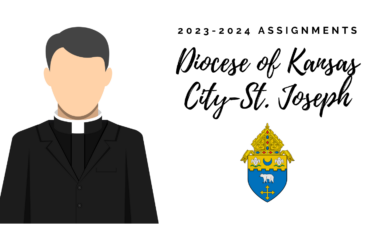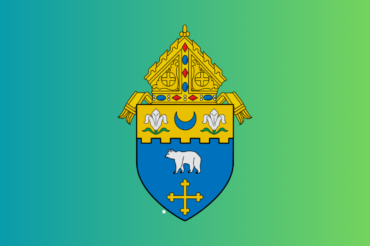Learning from Saint Joseph
“For this just man was given by you as spouse to the Virgin Mother of God and set as a wise and faithful servant in charge of your household to watch like a father over your Only Begotten Son …” from the Preface for the Solemnity of Saint Joseph
This past weekend several of our parishes expressed devotion to Saint Joseph by holding popular customs of prayer and the traditional Saint Joseph tables filled with cookies and food. On Monday, the Solemnity of Saint Joseph, I also celebrated Mass at our Cathedral in Saint Joseph to mark the 150th anniversary of the creation of the Diocese of St. Joseph, which preceded our current diocese. Intimately linked as well is the city and our diocese which bear his name. He is one of our diocesan patron saints.
Saint Joseph also looms large in the Universal Church. Early in his papacy, Pope Francis instructed that his name be included in Eucharistic Prayers 2-4, just after our Blessed Mother. As the earthly head and protector of the Holy Family at Nazareth, he has also been deemed the patron and protector of God’s Family on earth, the Catholic Church.
For all his popularity, Saint Joseph is still a bit of a mystery man. He appears in the Gospels at key moments, and yet we have no record of any of his words. After the early events at Bethlehem, Jerusalem and Nazareth, he is not mentioned again. But, even with this paucity of information, Saint Joseph has much to teach us through his example and the way he fulfilled his unique vocation in God’s design. Some of the virtues/qualities of Saint Joseph that have particular relevance for our time are these: attentiveness, obedience and chastity.
On several occasions, Saint Joseph received God’s word, sometimes in dreams. He was attuned to the movements of the Holy Spirit in his life as he prepared for marriage as well as after the birth of Jesus. In our complex lives, filled as they are with both noise and the pervasive distraction of our devices, Saint Joseph is a model for being attentive to God in silence and prayer. Like Saint Joseph, God speaks to us in ways that often exceed the limits of mere words.
Saint Joseph acted on God’s word in obedience. It is one thing to hear, another to act. His courage and obedience shielded Jesus and Mary from the evil plots of those seeking to destroy Jesus. It is likely that Saint Joseph continued to model that attentive obedience throughout the early years of Jesus’ life, perhaps into his young adulthood. Obedience is a virtue that has always been challenging, but even more so today. Submitting one’s will to something or someone greater requires humility; an acknowledgement that I need God and others to become good. I cannot do it on my own, and I must be willing to learn and be led.
Lastly, Saint Joseph is a model of chastity. His manly purity is often symbolized by his holding a lily. This is one of the more unusual parts of Saint Joseph’s vocation—to be called to be husband and serve in the role of father, and to live out that life in celibate chastity. This dimension of self-gift for Jesus and Mary is what endears Saint Joseph to so many. At a time when the Church’s Christian teaching on sexual morality and the call to chastity is misunderstood or seen as outdated, Saint Joseph serves to encourage all Christians who want to walk the path of purity as disciples of Jesus. In a special way, he is a friend of those who may be in irregular marriage situations and are awaiting some resolution. Priests too see Saint Joseph as a friend and model as they normally commit to living a chaste celibate fatherhood for their people. Likewise, men and women religious do so for similar reasons.
As we look toward Easter, let us do so having learned some foundational virtues for the Christian life from dear Saint Joseph. Saint Joseph pray for us!
+ Bishop James V. Johnston, Jr.
Catholic Key, March 23, 2018 issue





